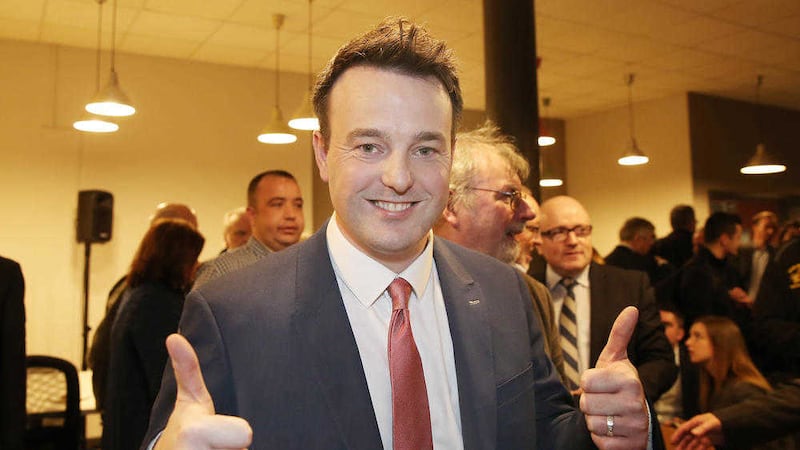With just a week to go, the SDLP’s leadership race has all the excitement of a wrestling match between a jellyfish and a blind tortoise.
Alasdair McDonnell seems confident: or as confident as it’s possible to be with his softly-softly-catchee-monkey prediction: “I won the leadership by a handful of votes and I will win it again by a bigger handful of votes.” So, after four years at the helm, he thinks he has won over a dozen or so extra votes.
Meanwhile, Colum “I’m not Alasdair McDonnell, so that in itself is worth a vote” Eastwood, has directed his campaign at the young by winning the support of almost all of the party’s old guard. It’s an odd tactic to pursue. On the one hand he says that, “We in the SDLP have spent far too much time obsessing about the immense democratic achievement that was Good Friday 1998”: while, on the other, he boasts of his endorsements from the old warhorses and voices who were the champions of that obsession. And then he argues that, “Progressive nationalism’s new story begins by taking full ownership of the success and/or failure of Northern Ireland.” But does that mean full ownership of the Good Friday Agreement’s ‘democratic achievement’?
What struck me most about Eastwood’s platform piece in Monday’s Irish News was the absence of any mention of the relationship between the SDLP and unionism under his leadership. Since he hopes to lead the SDLP and then begin the journey to electoral recovery, one would have thought that his view of unionism—particularly the DUP and UUP—would have been worth a mention. But no: not a word. Indeed, the piece doesn’t even really address the question of how he would differentiate the SDLP from Sinn Fein, other than through his curiously worded notion that: “It is we who must ensure that nationalism is understood as a demographic of belief rather than of birth.” Hmm. Nope, I don’t know what it means, either.
Seamus Mallon, though, has a very clear notion of what Eastwood must do: “Unless nationalists and unionists can develop an accommodation and better understanding with each other the possibility of further constitutional change is unlikely—this is the job that the SDLP now needs to undertake.”
I’m not quite sure what ‘constitutional change’ Seamus has in mind, although I’m pretty sure that unionists won’t be up for it. And it needs to be remembered, of course, that the relationship between the SDLP and UUP from 1998 to 2005 was, on many occasions, just as tetchy and dysfunctional as the present relationship between the DUP and Sinn Fein. I wonder if he, like the other former leaders, deputy leaders and ministers backing Eastwood, sees Colum as the vehicle for finishing the business they left unfinished back then?
Let’s be honest, the SDLP has no more interest in the long-term success of Northern Ireland than Sinn Fein has. Colum is an unambiguous united-Irelander: “Ireland’s political re-unification remains the biggest and the best idea around. It needs huge preparation. Big ideas deserve better than being reduced to a numbers game.” The only really difference between Sinn Fein and an SDLP led by him is that, “the cause of Irish nationalism is best served by making this part of the island work.” All he’s offering is a shift in hue from the turquoise of McDonnell’s leadership to a shade closer to the green of Sinn Fein.
In the same way that Mike Nesbitt has shifted to the right of the DUP (and even the TUV) on key issues—and picked up some electoral traction—Eastwood seems keen to outflank Sinn Fein with something he describes as “progressive nationalism.” Yet, like Nesbitt, this isn’t really offering anything new: it’s just a variant of what exists already. And in precisely the same way that the SDLP/UUP relationship doesn’t amount to much now (which is why he didn’t mention it), I don’t see what Eastwood is offering that would make an SDLP/DUP relationship preferable to the present SF/DUP relationship. Put bluntly, I’m still not sure what Colum is offering other than, as I said earlier, the unspoken mantra, “I’m not McDonnell.”
Will he win? The bookies have him as 1-4 favourite—but that could just be a handful of the old guard (quite a few of whom enjoy the odd bet or two) deliberately spooking Alasdair. But whichever of them wins is likely to do so by a slim margin, leaving the party as divided and prone to spats and constituency rivalries as ever.
I’ll leave you with the wisdom of an old friend who has been in the SDLP since 1979: “It’s a one-and-a-half horse race, Alex. But whoever wins needs a bloody good result next May or he and the rest of the party will end up in the knacker’s yard.”
I suspect both Alasdair and Colum would agree with that assessment.








